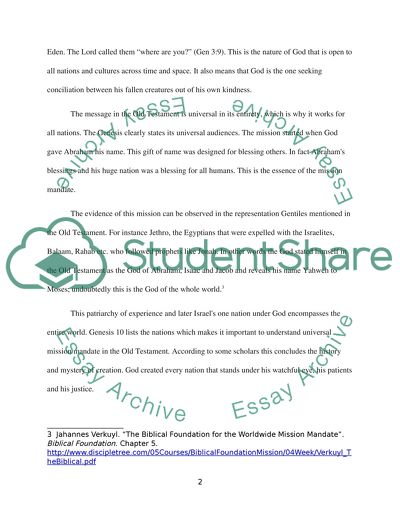Cite this document
(The Abrahamic Covenant and the Missions Mandate in the Old and New Testaments Essay Example | Topics and Well Written Essays - 2750 words, n.d.)
The Abrahamic Covenant and the Missions Mandate in the Old and New Testaments Essay Example | Topics and Well Written Essays - 2750 words. https://studentshare.org/religion-and-theology/1823135-the-abrahamic-covenant-and-the-missions-mandate-in-the-old-and-new-testaments
The Abrahamic Covenant and the Missions Mandate in the Old and New Testaments Essay Example | Topics and Well Written Essays - 2750 words. https://studentshare.org/religion-and-theology/1823135-the-abrahamic-covenant-and-the-missions-mandate-in-the-old-and-new-testaments
(The Abrahamic Covenant and the Missions Mandate in the Old and New Testaments Essay Example | Topics and Well Written Essays - 2750 Words)
The Abrahamic Covenant and the Missions Mandate in the Old and New Testaments Essay Example | Topics and Well Written Essays - 2750 Words. https://studentshare.org/religion-and-theology/1823135-the-abrahamic-covenant-and-the-missions-mandate-in-the-old-and-new-testaments.
The Abrahamic Covenant and the Missions Mandate in the Old and New Testaments Essay Example | Topics and Well Written Essays - 2750 Words. https://studentshare.org/religion-and-theology/1823135-the-abrahamic-covenant-and-the-missions-mandate-in-the-old-and-new-testaments.
“The Abrahamic Covenant and the Missions Mandate in the Old and New Testaments Essay Example | Topics and Well Written Essays - 2750 Words”. https://studentshare.org/religion-and-theology/1823135-the-abrahamic-covenant-and-the-missions-mandate-in-the-old-and-new-testaments.


